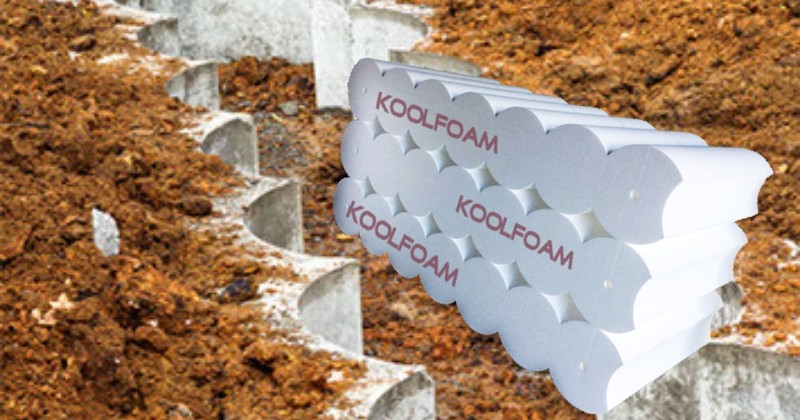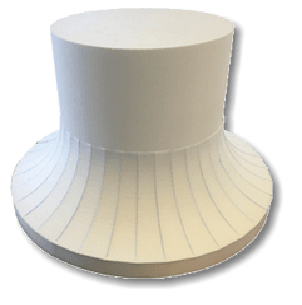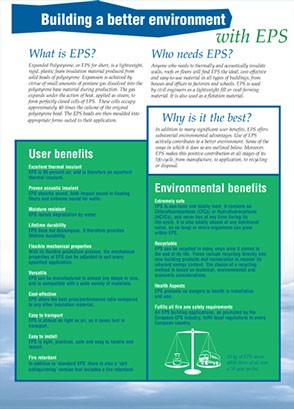construction
Expanded polystyrene or EPS is a lightweight cellular plastic foam material derived from petroleum and natural gas by-products. EPS is economical, sturdy and efficient and meets the Standards Association of Australia Australian Standard AS/NZS 4859.1-2018. No CFCs are used to mould EPS.
Phone Koolfoam and talk to our experienced staff.
FREE CAD Design service available.
Physical Property | Unit | L | SL | S | M | H | VH | Test Method |
|---|---|---|---|---|---|---|---|---|
Compression at 10% deformation, min. | kPa | 50 | 70 | 85 | 105 | 135 | 165 | AS 2498.3 |
Cross-breaking strength, min | kPa | 95 | 135 | 165 | 200 | 260 | 320 | AS 2498.4 |
Rate of water vapour transmission (max. measured parallel to rise at 23°C | ug/m²s | 710 | 630 | 580 | 520 | 460 | 85400 | AS 2498.5 |
Dimensional stability of legth (max) at 70°C dry condition 7 days | percent | 1 | 1 | 1 | 1 | 1 | 1 | AS 2498.6 |
Thermal resistance (min.)at a mean temperature of 23°C (50mm sample) | m²K/W | 50 | 70 | 85 | 85 | 85 | 85 | AS/NZS 4859.1 |
Flame propogation characteristics: - median flame duration (max.) - eigth value (max.) - median volume retained - eighth value (min.) | SD SD percent percent | 2 3 15 12 | 2 3 18 15 | 2 3 22 19 | 2 3 30 27 | 2 3 40 37 | 2 3 50 47 | AS 2122.1 |
1 W/m.K - 6.93 Btu in ft²h. °F |
EPS for Construction
Expanded Polystyrene is the number one choice for your next construction job.
EPS for Concreting
Concrete formwork - Void formers can be manufactured to most shapes specified by designers for projects such as bridge beams, elevated motorways etc in which void forming is fundamental to modern design.
Drainage (storm water) - Koolfoam specialise in concrete formwork for storm water drainage
Secant pile walls - Polystyrene is a low cost, simple method of accurately forming guides for secant piled walls
Bolt sleeves - scuppers - Ideal for leaving a void for bolts in cast concrete - may be dissolved after use
Prestressed concrete - Polystyrene blocks are commonly used to reduce the amount of concrete poured


EPS for Pipe Insulation
Arguable one of the most efficient products on the market offering excellent thermal properties that will outlast the pipework it covers.
EPS for Pool Builders
Koolfoam polystyrene in the marine environment.
Buoyancy -
In the construction of marinas and many other marine applications the buoyancy of EPS can support more weight that alternative materials
eg a cubic metre of EPS with a density of only 16kg/m3 has a buoyancy of 984kg!
Empty enclosures can be punctured and lose buoyancy but a fill of EPS prevents sinking whilst EPS stays in place.
Installation is quick and easy requiring minimal labour and therefore expense; its non-irritant, non-allergenic and odourless nature makes it superior to other insulation alternatives.
Koolfoam EPS is light, water and steam resistant, unaffected by fungi and bacteria, and will not support insect or pest life.
Flotation - Used for buoyancy in the construction of boats of all sizes
Pontoons - A cost effective floatation material in the production of pontoons - easily formed and long lasting in a marine environment
Technical Information
KoolfoamULTRA a new way to insulate with polystyrene
- Chemical
- Biological
- Electrical
- Fire
- EUMEPS
EPS is resistant over long periods to virtually all aqueous media:
• Water, seawater, salt solutions
• Lime, gypsum, Portland cement
• Caustic soda, caustic potash, strong ammonia, liquid manure, lime wash
• Soaps and solutions of wetting agents
• Hydrochloric acid (to 35%), nitric acid (to 50%), sulphuric acid (to 95%)
• Dilute mineral acids and weak acids such as lactic acid, carbonic acid or humic acids in peaty soils
• Solid salls eg wall saltpetre, artificial fertiliser
• Bitumen, bitumen omulsion
• Milk
• Silicone oils and greases
• Lower alcohols eg methylated spirits
EPS has limited resistance to ie the cellular material may shrink or suffer:
• Liquid paraffin, cooking oils, petroleum jelly, fuel oil
EPS is not resistant to hydrocarbons, chlorinated hydrocarbons, ketones and esters ie the cellular material rapidly collapses or dissolves:
• Fluxed or cut-back bitumen
• Tar and products based on tar
• Organic solvents eg acetone, ethyl acetate, xylene, paint thinners, trichloroethylene, carbon tetrachloride, turpentine
• Saturated hydrocarbons eg white spirit, kerosene
• Petrol
Prolonged exposure of EPS to UV light causes yellowing and embrittlement. Koolfoam recommend protecting EPS from direct outdoor exposure.

